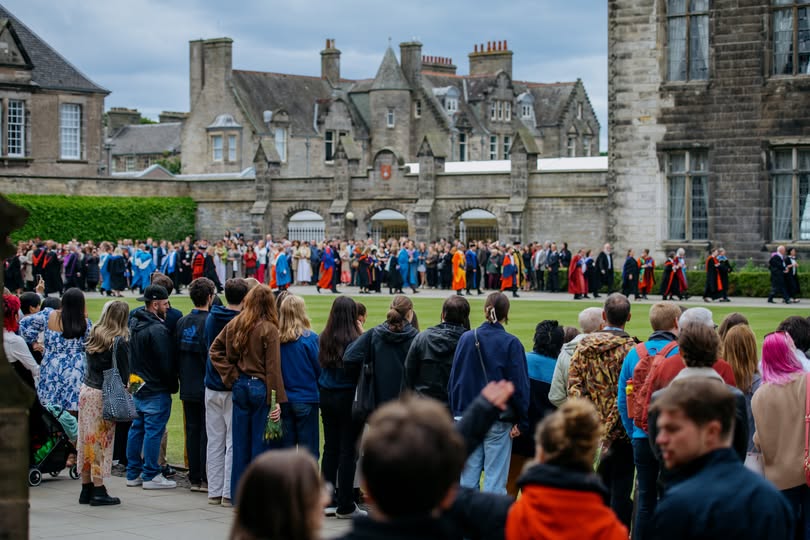What is BSc? It is one of the most popular undergraduate programs. Students aiming to dive deep into the world of science, technology, and mathematics would choose it. BSc can provide a foundation career in various fields ranging from research and development to health care and data analysis. If you want to attend college to study BSc courses, it is a good idea to look through this guide, where we will explain BSc from all aspects.
Key Takeaways
What is a BSc Degree? A Bachelor of Science (BSc) is an undergraduate degree rooted in science, technology, and math (STEM). Typically spanning 3 to 4 years, the curriculum prioritizes practical logic, research, and data analysis over the theoretical focus of a BA (Bachelor of Arts). It is the standard academic path for students aiming for technical careers in fields like engineering, IT, and healthcare.
Quick Facts:
Full Form: Bachelor of Science.
Duration: 3 years (UK, Australia, India) or 4 years (US, Canada).
Popular Majors: Computer Science, Nursing, Data Science, Biotech.
Salary Outlook: Generally higher earning potential than arts degrees due to technical skill demand.
Key Features of BSc
BSc contains a variety of specializations and subjects, so the relative information of BSc is also extensive. To understand BSc comprehensively, we need to explore it from different aspects. Here is a table to show the key features of BSc roughly.
| Overview of BSc | |
|---|---|
| Feature | Details |
| Full Form | Bachelor of Science |
| Duration | 3-4 years |
| Eligibility | Educational Qualification Minimum Marks Subject Requirements |
| Curriculum | Core Subjects Lab Work and Practical Sessions Elective Subjects Research Projects |
| Types of Programs | Full-Time Part-Time Online |
| Admission | Merit-Based Admission Entrance Exams |
| Tuition Fees | In the US: $10,000-$50,000/year In the UK: £9,000 to £38,000/year In India: INR 10,000 to INR 2,00,000/year |
| Further Studies | Master of Science (MSc) PhD Postgraduate Diplomas and Certifications MBA (Master of Business Administration) |
| Career | Research and Development Healthcare Software Development Environmental Science Teaching Engineering Data Analysis/Statistics Biotech & Pharma |
An Overview of BSc Courses List
A bachelor of Science is one of the most versatile and sought-after undergraduate degrees, offering students the opportunity to explore a wide range of scientific disciplines. Whether you’re passionate about unraveling the mysteries of the universe, advancing technology, or improving healthcare, BSc courses provide a structured pathway to specialize in a large scale of fields.
BSc Specializations
There are core and popular specialization courses:
- Traditional Sciences: Physics, Chemistry, Biology, Mathematical and Statistical Sciences, Zoology, Microbiology, Biochemistry
- Technology-focused: Computer Science, Information Technology, Biotechnology, Aviation, Multimedia, Nautical Science
- Interdisciplinary: Environmental Science, Forensic Science, Agriculture, Psychology, Earth and Atmospheric Sciences, Dietetics, Nutrition
BSc Curriculum
Each BSc specialization and subject own a unique curriculum and syllabus. It usually includes the theoretical knowledge, practical lab work, research projects, and sometimes internships.
- Core Subjects: Subjects directly related to the field, such as Physics, Biology, Chemistry, Computer Science, and so on.
- Elective Subjects: Some programs offer a variety of electives, allowing students to explore topics related to their field of study.
- Lab Work and Practical Sessions: Hands-on experience is a vital part of the learning process in most BSc courses.
- Research Projects and Internships: In the later years, students may be required to undertake research or a dissertation project or go out for off-campus internships.
Details of BSc Core Courses
Core and popular BSc courses are often the major choices of students every year. Each specialization focuses on the core subjects of that field and offers specific training and knowledge.
Natural Sciences
- BSc in Biology
Biology is the study of living organisms and ecosystems. Students in a Biology program will explore topics such as cellular processes, human anatomy, plant biology, animal behavior, and environmental science. The application of biology mainly distributes in medicine, environmental conservation, biotechnology, research & development, agriculture, and healthcare.
- BSc in Chemistry
Chemistry is the study of the composition, properties, and reactions of matter. A BSc in Chemistry will cover core topics such as organic chemistry, inorganic chemistry, physical chemistry, and analytical chemistry. Chemistry can be applied in the areas of pharmaceuticals, environmental science, energy (renewable energy, fuel cells), food & beverage, materials science, forensic science.
- BSc in Physics
Physics is the study of matter, energy, and the fundamental forces of nature. BSc in Physics typically covers mechanics, electromagnetism, quantum physics, thermodynamics, and relativity. The areas of application of Physics include engineering, telecommunications, renewable energy, medical imaging, space exploration, electronics, materials science.
Mathematics and Statistics
- BSc in Mathematics
Mathematics is the study of numbers, quantities, shapes, structures, and patterns. A BSc in Mathematics is a rigorous and abstract course that dives into various branches of mathematical theory and applications. After graduated from mathematics, students can work as actuary, data scientist, financial analyst, cryptographer, researcher or academia.
- BSc in Statistics
Statistics is the study of data collection, analysis, interpretation, presentation, and organization. A BSc in Statistics focuses on methods and principles that help analyze and interpret data to make informed decisions. Students learning this discipline can work as data Analyst, market researcher, biostatistician, actuary, statistician in government agencies or healthcare.
Technical Subjects
- BSc in Computer Technology
Computer Technology focuses on the design, development, and implementation of computer systems and software. Students in this field study the components of computer systems, including processors, memory, and storage, and learn how to design and optimize them for various applications. Graduates typically work in roles like systems analyst, software engineer, hardware designer, network administrator.
- BSc in Information Technology
Information Technology (IT), on the other hand, focuses on the use of computer systems and technology to store, retrieve, transmit, and manipulate data. IT professionals focus more on applying technology to business and organizational needs. This subject usually be applied in IT support, network administration, systems administration, cybersecurity analyst, database administration.
BSc Eligibility Criteria

The eligibility requirements for BSc programs can vary slightly depending on the country, institution, and the specialization chosen. However, most institutions follow similar broad criteria for admission.
Educational Qualification
Candidates must have completed their higher secondary education (12th grade) or its equivalent. There is the minimum age requirement that the candidate must be at least 17 years old universally speaking. They also should have studies science subjects during the 12th grade education such as Physics, Chemistry, Mathematics, and Biology.
Minimum Marks
Most universities require candidates to have minimum percentage of marks in their 12th grade examinations for a BSc program. This varies by country, institution, and specialization. For example, in the US, admission to BSc programs is often based on a student’s high school GPA (Grade Point Average), SAT/ACT scores, and other extracurricular activities. A minimum GPA of around 3.0-3.5 (on a 4.0 scale) is typically expected for competitive universities.
Subject Requirements
Each field of study has specific subject prerequisites. For BSc programs in fields like Mathematics, Computer Science, Engineering, or Information Technology, students are typically required to have studied Mathematics as one of their major subjects in 12th grade. Programs like BSc in Physics, Engineering, and Astronomy require a background in Physics at the 12th-grade level. For programs such as BSc in Biology, Zoology, Botany, Environmental Science, and Biotechnology, a background in Biology is essential.
BSc Admission Process
If you want to apply for a BSc program, there are typically two ways offered. One is Merit-based admission, the other is entrance exams. Universities may adopt one or both processes to decide who is qualified to be admitted.
Merit-based Admission
Universities will select students according to their academic performance in high school( 12th grade) or its equivalent. They will also focus on relevant science subjects. Therefore, students who want to choose BSc must meet the required percentage or grade in subjects like Physics, Chemistry, Mathematics, or Biology. When universities select, they will release cut-off marks based on the application pool. It is mainly used for kess competitive programs.
Entrance Exams
There are also many countries which adopt the way of entrance exams as a key part of the admission process for BSc courses. These BSc entrance exams can effectively assess a candidate’s knowledge in specific subjects, through which universities can shortlist candidates. Subject-specific exams and general aptitude tests are typically two types of entrance exams for BSc admission. The former focuses on specific subjects related to the course. The latter aims to assess students’ problem-solving abilities, analytical thinking, and general knowledge. For example, SAT/ACT in the US, UCAT, and BMAT in the UK, JEE, NEET, and State-Level Entrance Exams in India are all entrance exams. This way is utilized in highly competitive programs for BSc.
Top Colleges for BSc Programs
As a comprehensive program offering a wide range of courses, BSc is orovided by many universities, colloges and institutions. Of course, there are plenty of famous and prestigious universities for BSc degrees.
| Top Colleges | In the US: Massachusetts Institute of Technology (MIT) Stanford University Harvard University California Institute of Technology (Caltech) |
| In the UK: University of Oxford University of Cambridge Imperial College London University College London (UCL) |
|
| In India: Indian Institute of Science (IISc) St. Xavier’s College, Mumbai Presidency College, Kolkata Loyola College, Chennai University of Delhi |
Benefits of a BSc Degree
A BSc degree offers a wide range of academic, professional, and personal benefits, making it an excellent choice for students who are passionate about science and technology. Whether you aim for a career in research, healthcare, or technology, the knowledge and skills acquired during your BSc will set you on a solid path toward success.
- Strong Foundation in Science: In-depth knowledge of scientific principles and analytical skills
- Career Opportunities: Access to diverse roles in science, healthcare, technology, and more
- Opportunities for Further Study: Pathway to MSc, PhD, and specialization in advanced fields
- Hands-On Experience: Lab work and internships provide practical, real-world skills
- Building a Professional Network: Connections through academic and industry-based collaborations
Career Prospects for BSc
A BSc degree opens up a wide array of career opportunities across various industries, from research and technology to healthcare, business, and environmental science. The skills gained during a BSc program—such as analytical thinking, problem-solving, and research capabilities—make graduates well-suited for a diverse range of professional roles.
Career Opportunities After BSc
After completing a BSc degree, graduates can enter a broad range of career fields depending on their specialization. Some career opportunities are directly linked to the specific BSc specialization, while others allow flexibility across industries due to the transferable skills gained.
- Research and Development: Research Assistant, Lab Technician, R&D Scientist
- Technology and IT: Software Developer, Data Analyst/Scientist, Network Administrator
- Healthcare and Medical Sciences: Medical Technologist, Nurse, Healthcare Manager
- Environmental and Agricultural Careers: Environmental Consultant, Agricultural Scientist, Wildlife Biologist
- Education and Academia: Teacher/Professor, Educational Consultant
- Business and Management: Business Analyst, Entrepreneurship
Salary Prospects for BSc Graduates
The salary for BSc graduates depends on the specialization chosen, the industry, the location, and the level of experience. There are many influencing factors, but we can give you an overview of the salary expectations across different fields:
| Field | Salary (Annually) |
|---|---|
| Technology and IT | |
| Software Engineer / Developer | $60,000 to $80,000 |
| Data Scientist | $70,000 to $90,000 |
| Healthcare and Medical Sciences | |
| Registered Nurse | $50,000 to $70,000 |
| Medical Laboratory Technician | $40,000 to $60,000 |
| Research and Development | |
| R&D Scientist | $50,000 to $75,000 |
| Research Assistant | $35,000 to $50,000 |
| Environmental and Agricultural Careers | |
| Environmental Consultant | $50,000 to $70,000 |
| Agricultural Scientist | $40,000 to $60,000 |
| Business and Management | |
| Business Analyst | $55,000 to $75,000 |
Who Opts BSc Courses
BSc courses are generally chosen by individuals who are interested in pursuing scientific, technical, or research-oriented careers. It is ideal for students who have a strong aptitude for science and a desire to contribute to the fields of research, technology, health, or engineering. The decision to pursue a Bachelor of Science degree depends on personal interests, career aspirations, and academic strengths.
| Profile | Preferred Courses |
|---|---|
| Science Enthusiasts | Physics Chemistry Biology Mathematics Environmental Science |
| Aspiring Researchers | Biochemistry Microbiology Biotechnology Physics |
| Health Science Aspirants | Nursing Medical Laboratory Technology Physiotherapy, Biomedical Science |
| Tech and Engineering Fans | Computer Science Information Technology Software Engineering |
| Environmental and Agricultural Focus | Agriculture Environmental Science Horticulture, Forestry |
| Psychology Enthusiasts | Psychology Cognitive Science Mental Health |
| Career Flexibility Seekers | Data Science Applied Sciences Engineering Physics |
| Entrepreneurs and Innovators | Biotechnology Environmental Engineering Renewable Energy |
BSc vs BA

The BSc full form is Bachelor of Science, but what is BA? Correspondingly, BA refers to Bachelor of Arts. Compared with BSc which primarily focuses on science, technology, and mathematics, BA focuses on humanities, social sciences, and arts disciplines.
BA degrees tend to be more theoretical and conceptual, focusing on communication skills, critical thinking, and engineering, but BSc courses are typically theoretical and practical in nature, with an emphasis on understanding scientific principles and conducting experiments.
In terms of curriculum structure, BSc program provides a more rigorous structure, with a greater emphasis on mathematics, statistics, and research methods. Lab work, experimentation, and practical applications are significant parts of the BSc programs. However, BA is more broader and more flexible on the curriculum. It emphasizes more the theoretical subjects and broad learning. The requirements of BA degree include more components on reading, writing, discussions, and interpretations.
There are also other differences between BSc and BA:
| Difference between BSc & BA | ||
|---|---|---|
| Sector | BSc | BA |
| Fields of Study | Computer Science Mathematics Chemistry Biology Environmental Science Biotechnology Engineering |
English Literature History Philosophy Political Science Sociology Economics |
| Career Path | Engineer Scientist Researcher Medical Technologist Software Developer Data Analyst Environmental Consultant |
Teacher / Educator Journalist / Writer Social Worker Human Resources Specialist Public Relations Manager Policy Analyst Artist |
| Duration | 3-4 years / 5 years | 3-4 years |
BSc vs BSc Hons
What is BSc Hons? There is a special kind in BSc, it called BSc Hons. The full form od BSc Hons is Bachelor of Science with Honours. BSc Hons is also the undergraduate degree. The main difference between BSc and BSc Hons is the former is general but the latter is specialized.
BSc provides foundational knowledge in various scientific disciplines which are broad-based education. BSc Hons is more research-based involving a higher level of academic rigor. It offers more advanced, in-depth learning in a specific field. Therefore, the “Honours” designation often indicates that the degree is awarded with higher academic performance or that it requires the completion of an extended research project.
Compared with BSc course structure which consists of theoretical learning and basic practical knowledge, students in BSc Hons are required to complete a dissertation or research project during the final year.
In addition, they are also different in other aspects such as BSc course duration:
| Difference of BSc & BSc Hons | ||
|---|---|---|
| Sector | BSc | BSc Hons |
| Duration | Typically 3 years | 3-4 years |
| Entry Requirements | Standard academic qualifications | Higher academic requirements and entry exams |
| Career Opportunities | Entry-level positions in science fields |
Advanced positions, research roles, higher chances of graduate studies |
| Academic Standing | Standard undergraduate degree | Recognized as a higher academic qualification with more prestige |
| Postgraduate Opportunities | May need further specialization (MSc, PhD) |
Better chances for postgraduate programs |
Find A Student Accommodation with uhomes.com
If you are a student who is going to learn BSc courses especially abroad, you may need to think about the question of the accommodation there. For example, there are many top universities offering BSc programs in the US and the UK, you may want to find a student housing in New York or a student accommodation in London, where the expenses of house are expensive.
It can be easy as you choose us uhomes.com for our services such as 1-on-1 professional support, verified listings, price-match guarantee, and exclusive offers. You can get a nice house here to enjoy your college life!
Conclusion
A Bachelor of Science is an excellent undergraduate degree for students passionate about science, technology, mathematics, and related fields. It provides a solid foundation in scientific principles and research methodologies, equipping students with essential problem-solving, analytical, and practical skills. Whether you’re looking to pursue a career in healthcare, engineering, data science, or environmental science, a BSc opens the door to various exciting and rewarding career paths.
FAQ
BSc in education refers to Bachelor of Science which is an undergraduate academic degree awarded to students after they complete a program of study in the fields of science or technology. It usually takes about three to four years to complete the degree, depending on the country and the specific program.
Typically, BSc course focus on subjects like mathematics, physics, chemistry, biology, engineering, computer science, and other STEM (Science, Technology, Engineering, and Mathematics) disciplines. BSc course is designed to provide students with both theoretical knowledge and practical skills in their chosen field.
Job prospects after a Bachelor of Science degree are, for example, Research and Development, Technology and IT, Healthcare and Medical Sciences, Environmental and Agricultural Careers, Education and Academia, Business and Management.
After completing a BSc degree, graduates can enter a broad range of career fields depending on their specialization.
Top specializations for a Bachelor of Science are Physics, Chemistry, Biology, Mathematical and Statistical Sciences, Computer Science, Information Technology, Biotechnology, Forensic Science.
Yes, a Bachelor of Science (BSc) degree is definitely a good option for the future, particularly if you’re passionate about science, technology, and problem-solving. The skills you develop, the knowledge you gain, and the career opportunities available make a BSc a solid foundation for both professional success and further academic pursuits.
The salary for BSc graduates depends on the specialization chosen, the industry, the location, and the level of experience. While several BSc specializations offer high earning potential, Computer Science, Data Science, Engineering (especially Software and Petroleum), and Artificial Intelligence are among the highest-paying fields.
Choosing the “best” BSc course depends on several factors, including your interests, skills, career goals, and the future demand for specific fields. The popular courses for BSc are Computer Science, Data Science, Engineering (especially Software and Petroleum), and Artificial Intelligence.
This choice would be influenced by many factors. BSc primarily focuses on science, technology, and mathematics, but BA focuses on humanities, social sciences, and arts disciplines. BA degrees tend to be more theoretical and conceptual, focusing on communication skills, critical thinking, and engineering, but BSc courses are typically theoretical and practical in nature, with an emphasis on understanding scientific principles and conducting experiments.
Common specializations for BSc are mathematics, physics, chemistry, biology, engineering, computer science, and other STEM (Science, Technology, Engineering, and Mathematics) disciplines.
Types of courses based on delivery are Full-Time, Part-Time, and Online programs.








